-
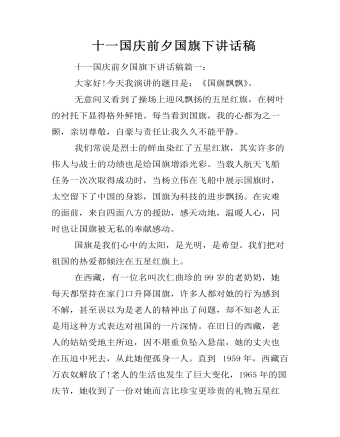
十一国庆前夕国旗下讲话稿
十一国庆前夕国旗下讲话稿篇一: 大家好!今天我演讲的题目是:《国旗飘飘》。 无意间又看到了操场上迎风飘扬的五星红旗,在树叶的衬托下显得格外鲜艳。每当看到国旗,我的心都为之一颤,亲切尊敬,自豪与责任让我久久不能平静。 我们常说是烈士的鲜血染红了五星红旗,其实许多的伟人与战士的功绩也是给国旗增添光彩。当载人航天飞船任务一次次取得成功时,当杨立伟在飞船中展示国旗时,太空留下了中国的身影,国旗为科技的进步飘扬。在灾难的面前,来自四面八方的援助,感天动地,温暖人心,同时也让国旗被无私的奉献感动。 国旗是我们心中的太阳,是光明,是希望。我们把对祖国的热爱都倾注在五星红旗上。 在西藏,有一位名叫次仁曲珍的99岁的老奶奶,她每天都坚持在家门口升降国旗,许多人都对她的行为感到不解,甚至误以为是老人的精神出了问题,却不知老人正是用这种方式表达对祖国的一片深情。在旧日的西藏,老人的姑姑受地主所迫,因不堪重负坠入悬崖,她的丈夫也在压迫中死去,从此她便孤身一人。直到 1959年,西藏百万农奴解放了!老人的生活也发生了巨大变化,1965年的国庆节,她收到了一份对她而言比珍宝更珍贵的礼物五星红旗。从此即使没有国歌伴奏,没有正规的旗杆她还是每天按时升降国旗,并在旗杆上涂抹上代表吉祥的酥油,来表达对祖国的挚爱和祝福。526个月、15780天,整整45年。老人用这种方式表达着纯朴的爱。
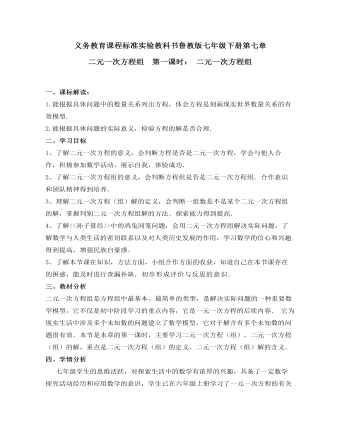
二元一次方程组教案教学设计
1、问题1的设计基于学生已有的一元一次方程的知识,学生独立思考问题,同学会考虑到题中涉及到等量关系,从中抽象出一元一次方程模型;同学可能想不到用方程的方法解决,可以由组长带领进行讨论探究.2、问题2的设计为了引出二元一次方程,但由于同学的知识有限,可能有个别同学会设两个未知数,列出二元一次方程;如果没有生列二元一次方程,教师可引导学生分析题目中有两个未知量,我们可设两个未知数列方程,再次从中抽象出方程模型.根据方程特点让生给方程起名,提高学生学习兴趣.3、定义的归纳,先请同学们观察所列的方程,找出它们的共同点,并用自己的语言描述,组内交流看法;如果学生概括的不完善,请其他同学补充. 交流完善给出定义,教师规范定义.
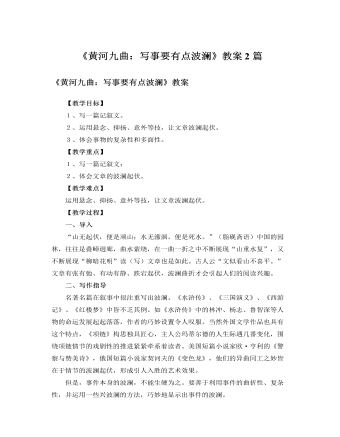
人教版高中语文必修1《黄河九曲:写事要有点波澜》教案2篇
1.悬念法悬念法又称关子。它是作者为了激发那种“紧张与期待的心理活动”,在行文中有意采取的一种积极而有效的手段。这种手段包括“设悬”和“解悬”两方面。所谓 “设悬”就是设置悬念,即在情节发生发展的关键时刻或人物命运攸关的重要关头,叙述戛然而止,转叙他事。从而引起读者强烈的寻根问底的兴趣。所谓“解悬” 也叫“释悬”,就是指在情节发展的特定阶段,通过矛盾的解决,揭示事情原委和人物命运的结局,使读者的期待心理得以满足。如《驿路梨花》,当人们正为露宿而发愁时出现了一间神秘的小屋,小屋的主人是谁呢?猜想间,有人来了,但也不是屋子主人,那小屋子的主人是谁呢?终于知道了小屋是解放军盖的,但为什么要盖这间小屋呢?这样“设悬——释悬——带出新悬念”,环环相扣、层层递进,使文章韵味无穷。
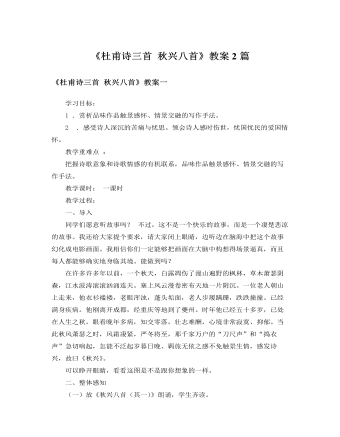
人教版高中语文必修3《杜甫诗三首 秋兴八首》教案2篇
4、主旨 哪一联明确地点明全诗题旨?表达了作者的什么感情?试做分析 颈联。 菊花开在秋天,所以这 “ 丛菊 ” 回应了诗题中那个 “ 秋 ” 字。 “ 他日 ” 可以指过去也可以指未来,在这里是指过去。“丛菊两开”,指诗人于 765 年离开成都,原打算很快出峡,但这年留居云安,次年又留居夔州,见到丛菊开了两次,还未出峡,故对菊掉泪。秋菊两度盛开,使诗人再次洒下往日流过的眼泪。“开”字双关,一谓菊花开,又言泪眼随之开。此时他仍然滞留在他乡,他始终没有放弃回乡的打算。孤舟可以系住,使其不能泛诸中流,但诗人的心是系不住的。他的心早已越过江河,越过关山,飞到了长安。所以,一叶靠岸系绳的孤舟,始终都牵动着诗人的故园之思。这一联是全篇诗意所在。孤舟本来只能系住自己的行踪,却把诗人的思乡之心也牢牢地系住了,故见舟伤心,引出故园之思,表现出思乡之情的深沉浓烈和欲归不得的无奈与凄伤,为文章的主旨句。
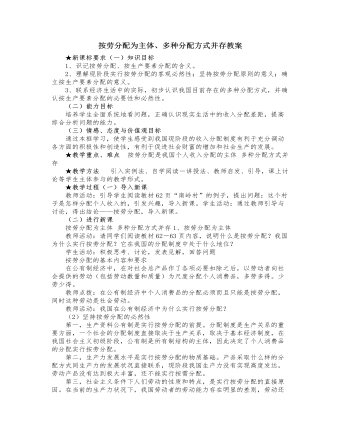
人教版高中政治必修1按劳分配为主体、多种分配方式并存教案
(3)确立按生产要素分配的意义确立按生产要素分配的原则,是对市场经济条件下各种生产要素所有权存在的合理性、合法性的确认,体现了国家对公民权利的尊重,对劳动、知识、人才、创造的尊重。有利于让一切生产要素的活力竞相迸发,让一切创造社会财富的源泉充分涌流,以造福人民。(三)课堂总结、点评 通过这节课的学习,我们懂得了在我国社会主义初级阶段,实行以按劳分配为主体、多种分配方式并存的制度,把按劳分配和按生产要素分配结合起来具有客观必然性,也有重要的意义。★课余作业 组织学生撰写社会调查报告,要求学生调查自己家里的收入情况,分清哪些收入是按劳分配所得,哪些是非按劳分配收入,并进一步分析现在的收入形式与以前相比有哪些变化,这种变化给家庭的生活带来哪些影响?★教学体会本节内容是与学生生活实际密切联系的内容,在学习中应该多引入日常生产、生活中常见的一些实例,让学生去深刻理解这些知识,并能够从自己的实践中理解、把握我国分配政策的合理性。

人教版高中历史必修1古代希腊民主政治教案
二.运用思考题目,激发学生对本课问题的探究,检查学生在学习过程中,结合所学的知识,对问题的思考、质疑;从而学会查阅、搜集资料,分析、整理;通过讨论、交流,得出新的认识。学生可根据自己的实际情况和个人爱好,可选择不同的作业呈现方式,包括作业的问题的选择、缴交的方式(制作、小论文、课件)等等,从而体现学生对古代希腊雅典民主政治产生的条件、雅典民主政治的内容及其意义的认识的程度。1.“东西方不同政治制度选择的因素分析”(课前)2.古代雅典民主政治制度对人类文明的影响。(课后)七.反思与总结本课的设计在实施过程中,总体效果比较好,对课标的要求基本达至。尤其是通过东西方不同政治制度选择的对比,不但复习了旧的知识,而且加深了对新知识的掌握,从而有更深入的认识。学生在这个问题的学习过程中,通过课前自身的活动(搜集、查阅资料),逐步培养历史的学习的方法;在课堂上,同学们通过讨论的过程,互相交流、分享心得体会;逐步提高自己的思维能力。
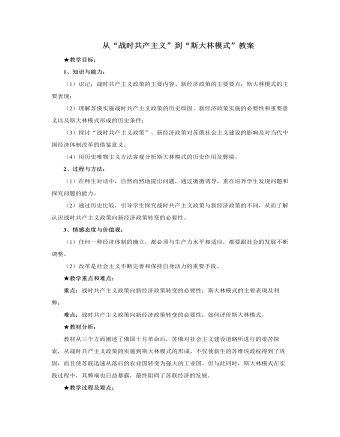
人教版高中历史必修2从“战时共产主义”到“斯大林模式”教案
5、弊端:(1)经济发展不均衡,片面发展重工业,使轻工业和农业长期处于落后状态;(2)对农民的剥夺太重,挫伤了农民的生产积极性;(3)长期执行指令性计划严重削弱了企业的生产自主权,不利于发挥企业的生产积极性,制约了苏联经济的可持续发展。(4)计划经济体制确立后,没有随着社会的变化进行调整,二战后逐渐僵化,丧失了自我完善的功能,成为苏联解体的重要因素。【合作探究】斯大林模式的评价及经验教训:积极:①使苏联迅速实现了 工业化②苏联经济实力的迅速增长,为反法西斯战争的胜利奠定了 物质基础 。消极:①政治:高度集权,破坏了 民主与法制 ; ②经济:优先发展重工业使 农业和轻工业长期处于落后状态,农民生产积极性不高;计划指令,压制了地方和企业的积极性,阻碍苏联经济的发展高度集中的计划经济体制,成为东欧剧变和苏联解体的重要原因。
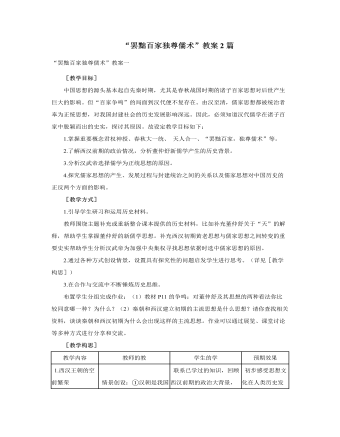
人教版高中历史必修3“罢黜百家独尊儒术”教案2篇
战国阴阳五行家邹衍认为,历史中的朝代更替是由于五德运行产生的影响。按照邹衍的学说,每个朝代必须与五德之一相连,因此,这个朝代就应当遵循这五德之一的要求来运转。董仲舒修改了这个理论,认为朝代的更替不是依循五德运行的顺序,而是依循“三统”,即黑统、白统、赤统的顺序。他在《三代改制质文》中说:每个朝代都依循一统,每统又各有其为政的系统。按董仲舒的说法,夏朝代表黑统,商朝代表白统;周朝则是赤统。夏、商、周三朝完成了这一历史循环。之后,历史又开始一次新的循环,新的朝代又应当代表黑统。继承周朝统治的既不是秦朝,也不是汉朝,而是孔子,他承受天命,创立了黑统。孔子所受天命,不是一种“法统”,而是一种“道统”。董仲舒说:“《春秋》大一统者,天地之常经,古今之通谊也。今师异道,人异论,百家殊方,指意不同,是以上亡以持一统;法制数变,下不知所守。臣愚以为诸不在六艺之科孔子之术者,皆绝其道,勿使并进。邪辟之说灭息,然后统纪可一而法度可明,民知所从矣。”
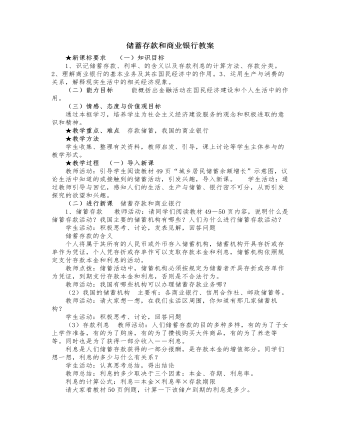
人教版高中政治必修1储蓄存款和商业银行教案
第三、结算业务结算业务时商业银行为社会经济活动中的货币收支提供手段与工具的服务。银行从中收取一定的服务费用。除上述三大业务外,商业银行还可以提供债券买卖与兑付、代理买卖外汇、代理保险、提供保管箱等其他服务。教师活动:商业银行在我国经济建设中具有巨大作用。请同学们看教材52页专家点评。学生活动:阅读课本,认真总结,得出结论(三)课堂总结、点评 这节课我们重点学习了储蓄存款和商业银行的有关知识,知道了储蓄存款活动程序、主要机构、特点和利息的计算等常识,了解了各种商业银行主要业务及其作用。这对于我们在日常生活中正确地办理金融储蓄业务将有重大指导作用。★课余作业 组织学生到附近银行、企业、居民中,咨询银行信贷活动的程序及原则要求,并亲自到商业银行办理一次存款和取款活动。
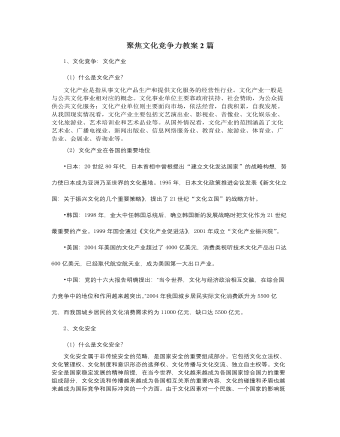
人教版高中政治必修3聚焦文化竞争力教案2篇
教学目的:通过学生课前收集资料、课堂展示、小组讨论及教师总结和讲解等形式,明确文化竞争力在国际竞争中的地位,感受各国各国日益激烈的文化竞争力,探讨如何提升中国特色社会主义文化的竞争力,培养学生的分析解决问题的能力,增强责任意识、科技意识和成才意识。教学时间:1小时课前准备:(1)学生分组收集美国、日本、英国等国家文化产业的发展状况和中国文化走向世界的资料,并要求制成简单的课件。(2)分组讨论课本P23—25的三个探究问题(①运用这些资料,从物质和精神两个方面,说明发展文化有什么意义。②你还能从社会生活的哪些现象中感受到一个国家的文化竞争力?③今天,中国文化为什么能够在世界各地赢得尊重与喝彩?),组长整理好讨论结果。
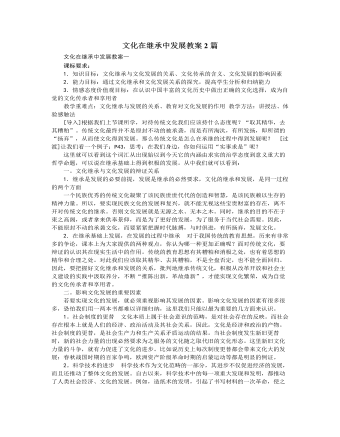
人教版高中政治必修3文化在继承中发展教案2篇
三、教育在文化传承中的作用 ★ 教师活动:引导学生阅读教材46页内容,并思考在文化传承中,教育有什么作用?★ 学生活动:积极思考并讨论问题 1、教育是人类特有的传承文化的能动性活动,具有选择、传递、创造文化的特定功能,在人的教化与培育上始终扮演着重要的角色。 ★ 2、教育通过对受教育者的“传道、授业、解惑”,把文化传递给下一代。 教育能够以浓缩的形式,重演人类在漫长的历史中走过的认识世界的过程,使人们在有限的学习生涯中获得既有的文化财富,“站在前人的肩膀上”从事文化创造。 3、随着教育方式的不断变革,教育在人类文化的传承中将产生越来越大的影响。★ 2)文化对社会发展产生深刻影响 ★ 文化作为一种精神力量,对人类社会的发展产生着深刻的影响,先进的、健康的文化对社会的发展产生巨大的促进作用,反动的、腐朽没落的文化则对社会的发展起着重大的阻碍作用。
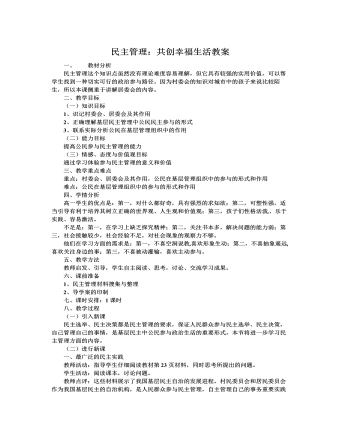
人教版高中政治必修2民主管理:共创幸福生活教案
一、 教材分析民主管理这个知识点虽然没有理论难度容易理解,但它具有较强的实用价值,可以帮学生找到一种切实可行的政治参与路径。因为村委会的知识对城市中的孩子来说比较陌生,所以本课侧重于讲解居委会的内容。二、教学目标(一)知识目标1、识记村委会、居委会及其作用2、正确理解基层民主管理中公民民主参与的形式3、联系实际分析公民在基层管理组织中的作用(二)能力目标提高公民参与民主管理的能力(三)情感、态度与价值观目标通过学习体验参与民主管理的意义和价值三、教学重点难点重点:村委会、居委会及其作用,公民在基层管理组织中的参与的形式和作用难点:公民在基层管理组织中的参与的形式和作用四、学情分析高一学生的优点是:第一,对什么都好奇,具有强烈的求知欲;第二,可塑性强,适当引导有利于培养其树立正确的世界观、人生观和价值观;第三,孩子们性格活泼,、乐于实践、容易激活。
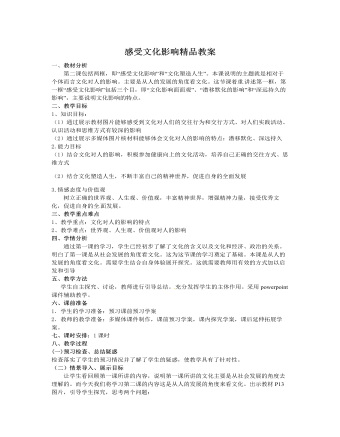
人教版高中政治必修3感受文化影响精品教案
(三)合作探究、精讲点拨 【情景导入,感受文化的影响】用多媒体展示教材“活动探究”P13的内容(图文并茂)情景问题:① 从这两幅画面中发现了哪些文化上的区别?你还能举出更多的事例吗?② 面对我们祖先创造的精美文化产品,人们的感慨,既有差异,又有共同之处。你能否解释这是为什么?(学生讨论、回答)情景问题:让学生阅读“活动探究”情景,带着这些问题去思考、合作、探究,在学生交流、探究的基础上,分组派代表完成这些问题,突出了学生的主体地位。设计意图:1、开门见山的方式引导学生进行新的学习探究活动,创设问题情景,引起悬念,吸引学生的注意力,激发学生的学习兴趣和探究欲望。2、通过自主探究,让学生感悟到道理越辩越明,促使学生存疑、质疑,从而产生强烈的探究欲望。

新人教版高中英语必修1Unit 1 Teenage Life-Listening and Speaking & Listening and Talking教案
Step 2 Listening and Talking1. The teacher is advised to talk with their new students about the related topic: Boys and girls, do you know some structures to talk about future activities? Talking about future activitiesWe’ll …I plan to …There’ll be …I hope to …We’re going to …2. After their small talk, the teacher can move on by playing the listening and solve the following task.Underline the expressions in the sentences below Cao Jing and Max use to talk about the future.We’ll learn useful skills.I plan to improve my spoken English.There’ll be students from different schools.I hope to make new friends.We’ll talk about teenage life.I’ll learn to make a fire.There’ll be students from different countries at the camp.There’ll be some experts there to show us how to live in the wild.We’re going to learn about wildlife.I’m going to give a speech.I think I’m going to enjoy the activities.I think we’ll have a lot of fun.3. Work in groups. Plan a youth camp.Teacher make the Ss think of ideas for the camp. And they can use the questions below to get started. And have the Ss present their ideas for a youth camp to the class.●What kind of camp is it?●Who will be there?●What will they do?●What will they learn?

新人教版高中英语必修1Unit 2 Travelling Around-Listening and Speaking & Listening and Talking教案
【教学目标与核心素养】1. Instruct students to get main facts by listening and motivate them to talk about the topics about how to prepare for the trip and make reservations by listening and ultimately can make travel arrangements and reservations. 2. Develop students’ sense of cooperative learning and individual thinking capability. 3. Develop students’ different listening skills to solve different listening comprehensive problems.4. Help students to understand how to use the structures “the present continuous tense (be doing) is used to express future plans.【教学重难点】1. Teach students how to focus on key words, not on single words or grammar.2. Prompt Ss to talk about the related topics, such as how to prepare for the trip and make a travel plan.【教学过程】Step 1: Listening and SpeakingLead inThe teacher is advised to talk with their students about the places that they want to travel most both at home and abroad: boys and girls, if you have a chance to travel around the world, where will you go? After their small talk, the teacher can move on by finishing the following listening task:Before travelling, what do we need to prepare for the trip?

新人教版高中英语必修1Unit 3 Sports and Fitness-Listening and Speaking & Listening and Talking教案
Finally, after finishing the task above, the teacher is expected to instruct students to work in groups to finish the following project:Speaking ProjectWhat event or activity would you like to invite your friend to? Make a conversation with a partner.Ski Race: Zhangjiakou, a beautiful city in northern China, will host the Youth Ski Race in December.Track Meet: a great event for track –and –field lovers on 26 October.Gym Class: come and work out at a gym! You can make it.Part 2: Listening and Talking:The teacher is advised to talk with their new students about the related topic: Boys and girls , what do you think of sportsmanship? Let’s listen and find out:Play the listening and match each opinion with the right speaker. Who do you agree with? Why?Cao Jing _____________ Lily _____________ Max _____________A. An athlete should do his/her best to win.B. The girl should stop and help the other girl. Good sportsmanship is more important than wining!C. An athlete should think about honor and his/her fans if he/she is competing for his/her country.Listen again and circle the expressions that you hear in the conversation.

新人教版高中英语必修3Unit 1 Festivals and celebrations-Discovering Useful Structure教学设计
4.That was an experience that frightened everyone. →That was _____________________. 答案:1. taking 2. being discussed 3. in the reading room 4. a frightening experienceStep 6 The meaning and function of V-ing as the predicative动词-ing形式作表语,它通常位于系动词后面,用以说明主语“是什么”或“怎么样”一种表示主语的特质、特征和状态, 其作用相当于形容词; 另一种具体说明主语的内容, 即主语等同于表语, 两者可互换。The music they are playing sounds so exciting. 他们演奏的音乐听起来令人激动。The result is disappointing. 结果令人失望。Our job is playing all kinds of music. 我们的工作就是演奏各种音乐。Seeing is believing. 眼见为实。Step 7 Practice1. It is ________(amaze) that the boy is able to solve the problem so quickly.2. Buying a car is simply _______(waste) money. 3. Please stop making the noise—it’s getting ________(annoy). 4. complete the passage with the appropriate -ing form.La Tomatina is a festival that takes place in the Spanish town Bunol every August. I think many food festivals are __________ because people are just eating. however, this festival is _________ because people don't actually eat the tomatoes. Instead, they throw them at each other! the number of people ________ part in this tomato fight, can reach up to 20,000, and it is a very __________ fight that lasts for a whole hour. The _______ thing is how clean Bunol is after the tomatoes are washed away after the fight. this is because the juice form tomatoes is really good for making surfaces clean!答案:1. amazing 2. wasting 3. annoying4. boring interesting taking exciting amazing

新人教版高中英语必修3Unit 1 Festivals and Celebrations-Listening &Speaking&Talking教学设计
The theme of this section is “Talk about festival activities and festival experiences”.Festival and holiday is a relaxing and interesting topic for students. This part talks about the topic from the daily life of students’. In the part A ---Listening and Speaking, there are three conversations among different speakers from three countries(Japan, Rio and China), where the speakers are participating in or going to participate in the festivals and celebrations. So listening for the relationship among them is a fundamental task. Actually, with the globalization and more international communication, it is normal for Chinese or foreigners to witness different festivals and celebrations in or out of China. In the Conversation 1, a foreign reporter is interviewing a Japanese young girl who just had participated in the ceremony of the Coming-of-Age Day on the street and asking her feeling about the ceremony and the afterwards activities. Conversation 2, Chinese girl Li Mei is witnessing the Rio Carnival for the first time, and her friend Carla gives her some advice on the costumes which enables her to match with the carnival to have a good time. Conversation 3, a Chinese guide is showing a group of foreign visitors around the Lantern Festival and introducing the customs of the festival to them. The three conversations have a strong vitality and insert the festival and cultural elements from different countries. So perceiving the festivals and cultures from different countries is the second task. At the same time, the scripts also insert the targeted grammar --- v-ing as attributive and predicative, which students can perceive and experience in a real context and make a road for the further study. That is the third task. In the Part B--- Listening and Talking, the theme is “Talk about festival experience”, which is the common topic in our daily conversations. During the conversation, Song Lin, a Chinese student, asked Canadian friend Max about how to spend Christmas. In the conversation, Song Lin talked about experience and the feelings during the Chinese Spring Festival, during which there are not only some enjoyable things but some unpleasant things. After the listening, perhaps students find there are some similarities between Christmas and the Chinese Spring Festival as there are some differences in the origins and celebrations. For example, people always visit friends and relatives, decorate their houses, have a big dinner together, chat and give presents to each other.

新人教版高中英语必修3Unit 1 Festivals and Celebrations-Reading for writing教学设计二
Step 3 Analyzing article structureActivity 31. Teachers raise questions to guide students to analyze the chapter structure of this diary and think about how to describe the festival experience. (1)What should be included in the opening/body/closing paragraph(s)?(2)How did the writer arrange his/her ideas?(3)What kind of interesting details did the writer describe?(4)How did the writer describe his/her feelings/emotions during the event?2. Students read and compare the three sentence patterns in activity 2. Try to rewrite the first paragraph of the diary with these three sentence patterns. After that, students exchange corrections with their partners. Such as:●This was my first time spending three days experiencing the Naadam Festival in China’s Inner Mongolia Autonomous Region and it was an enjoyable and exciting experience. ●I'll never forget my experience at the Naadam Festival because it was my first time to watch the exciting Mongolian games of horse racing, wrestling, and archery so closely. ●I'll always remember my first experience at the Naadam Festival in China’s Inner Mongolia Autonomous Region because it was so amazing to spend three days witnessing a grand Mongolian ceremony. Step 4 Accumulation of statementsActivity 41. Ask the students to read the diary again. Look for sentences that express feelings and emotions, especially those with the -ing form and the past participle. Such as:● …horse racing, wrestling, and archery, which are all so exciting to watch. ● some amazing performances● I was surprised to see…● I was a little worried about. . . ● feeling really tiredOther emotional statements:●I absolutely enjoyed the archery, too, but the horse races were my favourite part. ●I'm finally back home now, feeling really tired, but celebrating Naadam with my friend was totally worth it. ●He invited me back for the winter to stay in a traditional Mongolian tent and cat hot pot. I can’t wait!2. In addition to the use of the -ing form and the past participle, the teacher should guide the students in the appreciation of these statements, ask them to memorize them, and encourage them to use them reasonably in writing practice.

新人教版高中英语必修3Unit 2 Morals and Virtues-Discovering Useful Structure教学设计
1. 表示时间。Hearing these stories, I’m skeptical about the place. = When I heard these stories. . . 2. 表示原因。Not knowing his address, I can’t send this book to him. = Because/Since/As I don’t know his address. . . 3. 表示结果。His father died, leaving him a lot of money. =. . . and left him a lot of money4. 表示条件。Going straight down the road, you will find the department store. = If you go straight down the road. . . 5. 表示让步。Being tired, they went on working. =Although they were tired. . . 6. 表示行为方式、伴随情况或补充说明。He lay on the grass, staring at the sky for a long time. =. . . and stared at the sky for a long time注意:非谓语动词作状语时, 如所提供的动词不能和句子中的主语保持一致, 动词-ing形式必须有自己的逻辑主语, 通常由名词或代词来担任, 这就是独立主格结构。The last bus having gone, we had to walk home. (having gone的逻辑主语是the last bus, 而不是we)Weather permitting, the football match will be played on Friday. (permitting的逻辑主语是time, 而不是the football match)Step 7 Practice1. ________(study) hard, you are sure to get first prize. 2. People use plastic in their daily life, _______(leave) large amounts of waste. 3. ________(work) hard at your lessons, you are to succeed. 4. The old man, ____________(work) abroad for twenty years, is on the way back to his motherland. 5. ______________(finish) his homework, he was playing on the playground. Answers: 1. Studying 2. leaving 3. Working 4.having worked 5. Having finishedStep 8 HomeworkFinish the homework on Page 22.

